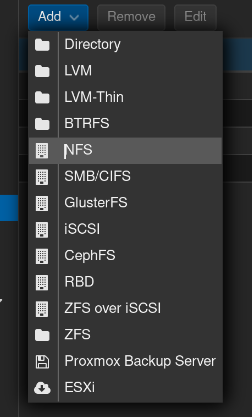Homelab upgrade - "Modern" alternatives to NFS, SSHFS?
-
I think I am on the same page.
I will provably keep Plex/Stash out of S3, but Nextckoud could be worth it? (1TB with lots of documents and medias).
How would you go for Plex/Stash storage?
Keeping it as a LVM in Proxmox?
-
What are you hosting the storage on? Are you providing this storage to apps, containers, VMs, proxmox, your desktop/laptop/phone?
-
-
-
Currently, most of the data in on a bare-metal TrueNAS.
Since the nodes will come with each 32TB of storage, this would be plenty for the foreseeable future (currently only using 20TB across everything).
The data should be available to Proxmox VMs (for their disk images) and selfhosted apps (mainly Nextcloud and Arr apps).
A bonus would be to have a quick/easy way to "mount" some volume to a Linux Desktop to do some file management.
-
-
-
-
Proxmox does support NFS

But let's say that I would like to decommission my TrueNAS and thus having the storage exclusively on the 3-node server, how would I interlay Proxmox+Storage?
(Much appreciated btw)
-
Your workload just won't see much difference with any of them, so take your pick.
NFS is old, but if you add security constraints, it works really well. If you want to tune for bandwidth, try iSCSI , bonus points if you get zfs-over-iSCSI working with tuned block size. This last one is blazing fast if you have zfs at each and you do Zfs snapshots.
Beyond that, you're getting into very tuned SAN things, which people build their careers on, its a real rabbit hole.
-
-
-
-
Ceph isn't something you want to jump into without research
-
You need to know what you are doing with Ceph. It can scale to Exobyte levels but you need to do it right.
-
-
I've used MinIO as the object store on both Lemmy and Mastodon, and in retrospect I wonder why. Unless you have clustered servers and a lot of data to move it's really just adding complexity for the sake of complexity. I find that the bigger gains come from things like creating bonded network channels and sorting out a good balance in the disk layout to keep your I/O in check.
-
Fam, the modern alternative to SSHFS is literally SSHFS.
All that said, if your use case is mostly downloading and uploading files but not moving them between remotes, then overlaying webdav on whatever you feel comfy on (and that's already what eg.: Nexctloud does, IIRC) should serve well.
-
I'd only use sshfs if there's no other alternative. Like if you had to copy over a slow internet link and sync wasn't available.
NFS is fine for local network filesystems. I use it everywhere and it's great. Learn to use autos and NFS is just automatic everywhere you need it.
-
Gotta agree. Even better if backed by zfs.


